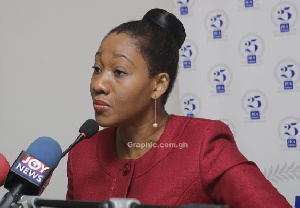 Jean Mensa is Chairperson of the Electoral Commission
Jean Mensa is Chairperson of the Electoral Commission
The Electoral Commission (EC) has terminated the contract of the foreign IT firm engaged in 2012 to manage the country’s elections data centre.
According to the EC, the foreign firm was given unfettered access to the data centre, could shut down systems arbitrarily, and was charging US$5.2 million for maintenance and internet annually.
The commission said last year, the firm presented a budget of US$56 million to upgrade the IT systems to be able to conduct the referendum held late last year.
The Chairperson of the EC, Mrs Jean Mensa, said the commission decided to terminate the contract and, instead, use its internal I.T staff to manage all I.T related activities involved in the management of elections.
In a meeting with President Nana Addo Dankwa Akufo-Addo at the Jubilee House in Accra yesterday, the EC Chairperson said the commission’s internal I.T staff of 55 personnel had been well trained to manage the electoral systems.
She said the internal staff was used to conduct last year’s referendum successfully to save the country from spending US$56 million on systems upgrade.
Mrs Mensa indicated that the local staff, when given the necessary training and support, could manage the country’s elections successfully “without placing the sovereignty of the country in the hands of a foreign entity.”
The EC Chairperson said she observed certain institutional lapses at the EC when she took over last year and described the culture there as “a free for all.”
“It is an institution that is not founded on rules, administrative policies and governance framework. There were no policies to guide finance, procurement, human resource, and administration,” she said.
Mrs Mensah noted that the commission existed solely as an election machine, with weak internal structures, systems, and policies.
To resolve that, she said the EC had engaged KPMG to carry out an institutional assessment which would be followed with a proper framework to govern all internal activities and practices.
Furthermore, she said the commission was making efforts to establish a permanent legal department and restructure its procurement department.
“We make procurements running into millions but we have only two people there. We are strengthening our capacity by bringing on board new staff,” he said.
Mrs Mensa spoke about the commission’s decision to institutionalise its Inter-Party Advisory Committee (IPAC) and efforts aimed at ensuring that political parties complied with all relevant legal provisions.
She commended President Akufo-Addo for giving the commission the necessary support and noted that the President had, since her assumption as EC Chairperson, not influenced its work in any way.
On electoral violence, the EC Chairperson said the commission had learnt lessons from the Ayawaso West Wuogon by-election and was working with the security services on how to prevent such violence in future.
She said a security task force had been established to prepare and identify flash points to prevent violence in the general elections next year.
President Akufo-Addo, on his part, commended the commission for the work done so far and pledged to give it the necessary support.
He said the government would not involve itself in the work of the EC and urged the commission not to be open for manipulation.
“What the ballot should do is to give the verdict of the will of the people. That is what should take place in any functioning democratic state,” he said.
According to the President, any form of interference in the work of the EC would be a distortion of the popular will of the people.
While commending the commissioners for institutionalising the IPAC meeting, he praised them for their efforts to reform the internal structures of the commission.
He said it was alarmed to hear that the commission’s I.T systems were managed arbitrarily by a foreign firm which had monopoly of the data centre.
The President said the decision to use internal staff to manage all aspects of the electoral process had the full support and commendation of the government.